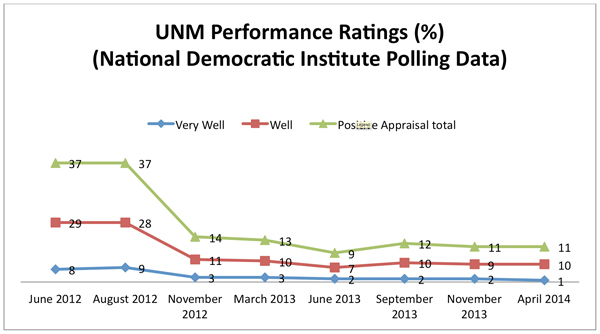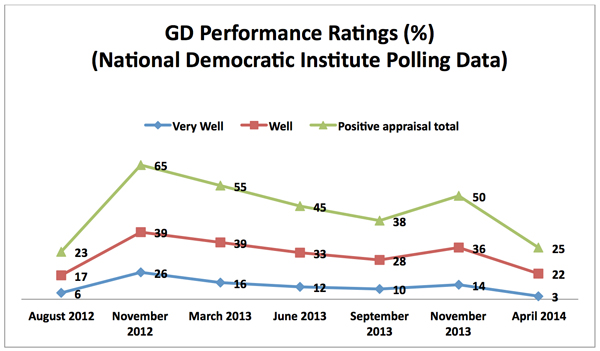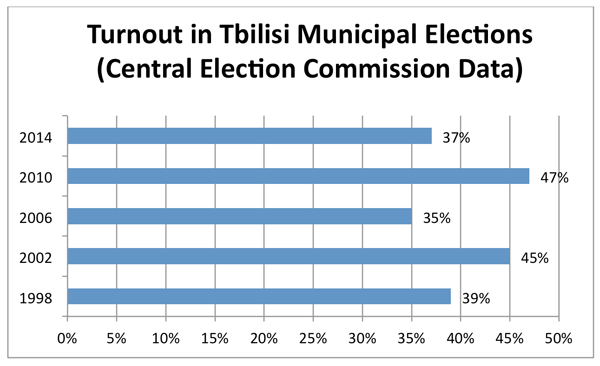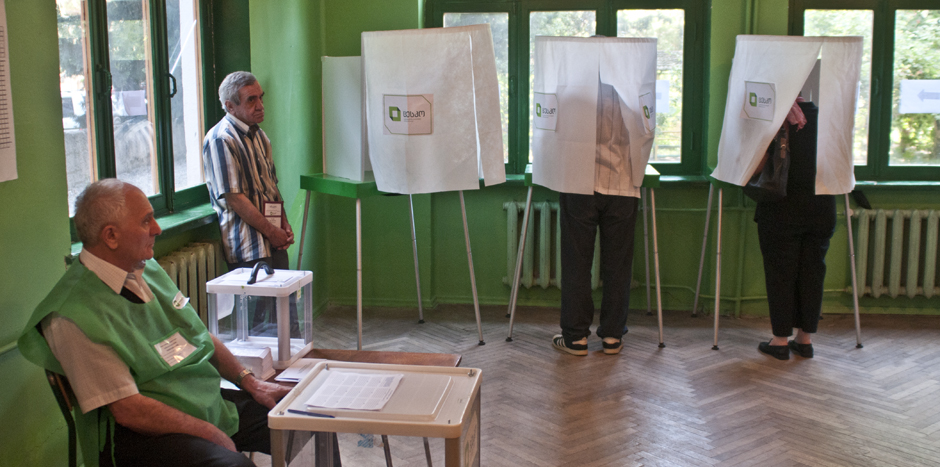Results
On Sunday, June 15th, Georgians headed to the polls to elect new municipal governments including Sakrebulos, Gamgebelis, as well as Mayors in 12 cities. In total 16, 190 candidates from 24 parties and blocs participated in elections with 257 candidates running in 59 municipalities for gamgebeli positions and 87 candidates running for mayoral positions.
In the Tbilisi mayoral race, exit polls and early results suggest that the Georgian Dream Coalition has finished first. Despite this, it appears that a run-off has not been avoided as early vote counts indicate that David Narmania has received less than the 50% required for outright electoral victory.
In the six other cities which Rustavi 2 commissioned exit polls in, Georgian Dream Candidates have finished first, but in four of the six cities, second rounds are expected.
In the Tbilisi Sakrebulo race, it appears that the Georgian Dream coalition, the United National Movement, the Burjanadze-led coalition- United Opposition, and the Alliance of Patriots of Georgia have gained seats and will gain representation through the party list system.
According to Transparency International, overall, Election Day was “calm and safe” but a number of violations and questionable practices were noted by observers. Generally, observers believe that the violations have not significantly effected results.
Background and Significance
The local elections’ significance comes not fully from the offices at stake, but more from the fact that they are the final in the full cycle of elections regularly held in Georgia- parliamentary, presidential, and municipal- in which the Georgian Dream appears to have won by significant margins.
The 2012 parliamentary elections were a sea change for the Georgian political landscape as they removed the United National Movement (UNM) from power in the first electoral handover of power in Georgian history.
These elections were followed by a period of ‘cohabitation’ wherein Mikheil Saakashvili of the UNM was President and the legislature was controlled by the Georgian Dream Coalition.
This period was particularly tense as the country was also transitioning from a presidential constitutional framework to a semi-parliamentarian framework. During this period, President Saakashvili fought for control as it became apparent that the UNM had lost significant support in society and UNM leaders were to face political backlash particularly through the legal system in what many international observers have characterized as political prosecutions and what the government has characterized as the return of rule of law to the country.
The 2013 elections brought the presidency to GD and ended the most public form of cohabitation, but in a number of local governments, UNM party members remained in office. This was despite the many claims that significant pressure was placed on local government officials who were UNM supporters to resign. The presence of remaining UNM supporters in local government has been continuously irksome for the Georgian Dream Coalition
Three steps forward and one step back- Legislative Changes
The legislative framework through which the local elections have been conducted is in large part new and was developed in the months preceding elections. The legislation contains areas of significant improvement and areas in need of improvement. The problems associated with the legislation can in part be attributed to the rushed time frame in which they were written and passed through parliament as yesterday’s elections loomed over the legislative process.
A significant change to the law includes the direct election of 11 mayors for the first time bringing the total in the country to 12 directly elected mayors. Previously, Tbilisi was the only city with a directly elected mayor and in other municipalities Mayors were elected by Sakrebulos.
Another significant positive change is that the electoral threshold for Mayors and Gamagebelis was set to 50%. Originally lower thresholds were debated with GD members arguing that the lower threshold would save taxpayer money through avoiding runoffs, while the opposition voiced vehement criticism. Though final numbers are unavailable, exit polling data suggests that the 50% threshold is highly likely to lead to runoff elections in a number of mayoral races. There is also a high likelihood that runoff elections will occur in a number of gamgebeli elections.
Sakrebulo thresholds were decreased for proportional, party list seats to 4% throughout the country from the previous 5% which aimed to encourage non-parliamentary party participation in local governance. In this goal, the legislation seems to have been successful with exit poll data showing two non-parliamentary parties crossing the 4% threshold in the Tbilisi Sakrebulo.
Despite these improvements, the most problematic area of the new legislation is the ability of Sakrebulos to impeach the directly elected mayors and Gamgebelis with a 2/3 vote. This has been a point of contention due to the fact that Sakrebulos had previously elected Gamgebelis whereas the position is now directly elected as discussed above. This point of legislation along with the “watering down” of the local self-governance law in comparison to the original draft law received criticism from a variety of civil society actors.
The Pre-electoral Environment
Although the legislative, electoral framework has improved, the electoral environment itself has been compromised by a number of incidents including emphatic protests outside of the local election commission in Marneuli by members of the UNM, the withdrawal of candidates from party lists under claimed governmental pressure, possible pre-electoral municipal budget spending manipulation, and most worryingly political violence and retribution.
On June 5th Gigi Ugulava protested the decision of the Marneuli District Election Commission not to include a candidate due to failing to meet residency requirements. In his protest he yelled at the head of the Commission “I promise you that you will regret this decision very much.” Ugulava’s behavior was roundly criticized as he failed to go through proper channels to express his protest. On June 10th a Tbilisi city court overturned the local commission’s decision and the candidate was reinstated. This decision along with the decision not to invalidate party lists based on candidate withdrawal was a significant positive step from the CEC in leveling the playing field for opposition participation.
The issue of administrative resources being improperly used in elections is once again present as in previous elections. Though not strictly illegal, project budgets were increased days before the electoral period in Vani, Kharagauli, Bolnisi, Chiatura, Ozurgeti, Kaspi, Khashuri, Zestafoni, Telavi, Ambrolauri, Oni, Khobi and Mtskheta according to a Transparency International report released June 13th.
A further issue complicating the electoral environment is the prosecutions of a significant number of UNM party leaders which has been ongoing over the last several years. Prime Minister, Irakli Gharibashvili, called for a moratorium on arrests of UNM figures on April 14th for the local elections.
In spite of the moratorium on arresting former officials, in their stead, an increase in incidences of politically motivated violence has occurred including the intimidation of UNM party members in Batumi and the beating and supposed, attempted kidnapping of MP Nugzar Tsiklauri . Further complicating the electoral environment, Justice Minister Tea Tsulukiania has requested that the prosecutor’s office open up an investigation into the United National Movement for faking persecution.
All of the above factors have compromised the electoral environment preceding Sunday’s elections.
Capital Candidates and Campaigns
The mayoral race in Tbilisi was the most contested race with 14 candidates running for the office. The main contestants, Nika Melia (UNM) and Davit Narmania (GD), are both relative new comers to the public stage, though Narmania was Minister of Infrastructure before running and Melia is the head of the Mtatsminda district of Tbilisi. The position has been hotly contested historically as approximately one third of the Georgian population resides in Tbilisi.
The candidates’ policy positions have been similar with both promising reduced price public goods. While the candidates’ positions are similar, notable policy differences are noticeable in the realm of economic development with Melia focusing more on improving the business environment and Narmania focusing on improving social conditions as a means to economic development, with the notable campaign promise to plant 1,000,000 trees in the city. Besides policy positions roughly resembling each other, candidates’ campaigns have surrounded criticism of other parties.
The Tbilisi mayoral race is likely to have a second chapter in the form of run-off elections. Interestingly, exit poll results have fallen along organizational lines. Exit polls from Rustavi 2, which has been the most likely media outlet to present positive information about the UNM during the election period according to media monitoring reports, indicate a runoff and the Georgian Dream’s exit polls indicate a runoff is unlikely. The International Society for Fair Elections and Democracy’s parallel vote tabulation also indicate that a run-off election is highly likely with David Narmania receiving 45.89% of the vote and Nika Melia receiving 27.99% of the vote.
Outlook
Will the UNM Disappear?
Prime Minister Gharibashvili’s statements, in his role of Georgian Dream party head, about the “disappearing” and “getting rid of” the UNM, are not only the words of a politician but a possible outcome in the near future.
All politics aside, this should be a concern for policy makers domestic and international alike as it is likely to work against the consolidation of democracy in Georgia. Political parties in consolidated democracies, ideally, function to relay popular sentiment to government and fulfill popular will through elected office. Without a consolidated party system, stability is threatened and democratic backslide is possible with only one party in government.
Despite the Prime Minister’s statement, exit polls suggest a clear second place position for the UNM. Thus, it appears that the UNM will be present and their political survival will largely depend on their own actions in appealing to voters in the years to come leading up to 2016 parliamentary elections along with future government actions including the potential future arrests of UNM party leadership.
Since losing office, the UNM has held steady performance ratings and around 10% of likely voters have consistently reported that the UNM is the party closest to them. This suggests that the UNM has a base of support at the grass roots level, implying that the party may not disappear. Notably, the UNM’s projected vote counts in Tbilisi elections are roughly twice as high as their performance rating. As will be further discussed below, the Georgian Dream’s vote counts exhibit a similar pattern.

Note: Data was collected for the months indicated. The trend line is included for ease of viewing, but does not indicate inter-polling period performance rating dynamics. Data points are marked by triangles, squares or diamonds on the trend line.
What’s on the Georgian Dream’s Horizon?
The Georgian Dream Coalition is a diverse group of parties which came together in 2012 to oppose the UNM. Being successful in this goal, they are still moving forward with other policy priorities and appear to have performed well in the local elections. Despite this, the future of the coalition is an open book.
Significantly, the Georgian Dream Coalition has experienced a rapid fall in performance ratings over their term in office with a high of 65% in November of 2012 shortly after taking office declining to 25% in April of 2014. The 40 percentage point drop in performance ratings though, as shown above, has not resulted in a gain for the United National Movement. This movement in performance ratings suggests that the Georgian electorate may be disappointed with the performance of the Georgian Dream while also not seeing a viable alternative in the opposition United National Movement.

Note: Data was collected for the months indicated. The trend line is included for ease of viewing, but does not indicate inter-polling period performance rating dynamics. Data points are marked by triangles, squares or diamonds on the trend line.
Turnout in Sunday’s elections was 43.31% nationally and 37.3% in Tbilisi. The low turnout rates also suggest the electorate may be disappointed with both the GD and the UNM, as generally, in elections that lack desirable party alternatives to a ruling government, voters are less likely to come to the polls. This may explain the lower turnout rates in 2014 compared with previous municipal elections (2010=49%). Notably, turnout is lower than in either 2013 (47%) or 2012 (67%).

With performance ratings of both major parties at a low level and turnout figures further suggesting electoral disappointment with the option available to them, the Georgian political landscape is likely to become more competitive in the years to come.
The introduction of the high threshold in local elections has led to a significant likelihood of run-off elections in a number of locales, which is also likely to increase the competitiveness of the electoral environment in Georgia.
The United National Movement has survived another round of elections and shown that while it is not the most popular party in the country, it is still electorally viable- this is the first time in Georgian history that a party has gained power, lost it through elections, and not immediately disappeared from the political space.
All three of these developments are positive as they imply that the electoral environment will become more competitive in the future which is likely to help consolidate democracy in Georgia.
Dustin is a Research Consultant at the Caucasus Research Resource Center- Georgia (CRRC-Georgia).


